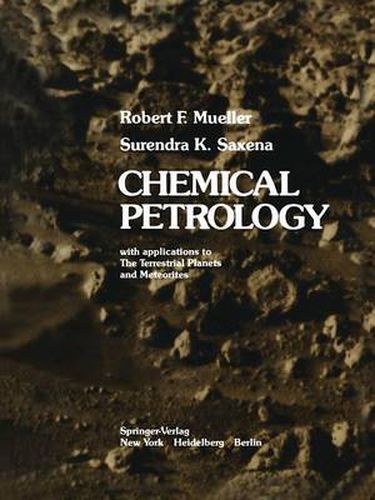Readings Newsletter
Become a Readings Member to make your shopping experience even easier.
Sign in or sign up for free!
You’re not far away from qualifying for FREE standard shipping within Australia
You’ve qualified for FREE standard shipping within Australia
The cart is loading…






This title is printed to order. This book may have been self-published. If so, we cannot guarantee the quality of the content. In the main most books will have gone through the editing process however some may not. We therefore suggest that you be aware of this before ordering this book. If in doubt check either the author or publisher’s details as we are unable to accept any returns unless they are faulty. Please contact us if you have any questions.
Chemical petrology is essentially the physical chemistry of rocks and associated fluids, although it also borrows heavily from such other sciences as mineralogy. In terms of fundamentals it is firmly grounded in chemical thermodynamics and kinetics. In its treatment of terrestrial environments it grades imperceptably into sedimentology, geochemistry, and geophysics and in extraterrestrial environments into cosmochemistry. It is one of the most important branches of planetology and meteoritics. The unity of approach of thermodynamics and kinetics to processes in these diverse environments is stressed in this book by numerous examples which have been chosen to illuminate different aspects of the subject. Thus we have discussed in some depth such problems as the genesis of layered basic complexes, calc-alkaline batholiths, chondri tic meteorites, and the surface-atmosphere interaction of the planet Venus because these are important and because they are particularly good illustrations of the chemical petrology approach. Considerable attention also has been devoted to volcanic processes. In our treatment of metamor phism in particular, an attempt has been made to correlate and integrate the vast number of recent experimental, theoretical, and field studies. However, we have not attempted a comprehensive survey of all known rock types or occurrences, nor did we review all the diverse opinions and conclusions on the origins of controversial rocks. Instead we have chosen to stress interpretations we regard as following most directly from the evidence.
$9.00 standard shipping within Australia
FREE standard shipping within Australia for orders over $100.00
Express & International shipping calculated at checkout
This title is printed to order. This book may have been self-published. If so, we cannot guarantee the quality of the content. In the main most books will have gone through the editing process however some may not. We therefore suggest that you be aware of this before ordering this book. If in doubt check either the author or publisher’s details as we are unable to accept any returns unless they are faulty. Please contact us if you have any questions.
Chemical petrology is essentially the physical chemistry of rocks and associated fluids, although it also borrows heavily from such other sciences as mineralogy. In terms of fundamentals it is firmly grounded in chemical thermodynamics and kinetics. In its treatment of terrestrial environments it grades imperceptably into sedimentology, geochemistry, and geophysics and in extraterrestrial environments into cosmochemistry. It is one of the most important branches of planetology and meteoritics. The unity of approach of thermodynamics and kinetics to processes in these diverse environments is stressed in this book by numerous examples which have been chosen to illuminate different aspects of the subject. Thus we have discussed in some depth such problems as the genesis of layered basic complexes, calc-alkaline batholiths, chondri tic meteorites, and the surface-atmosphere interaction of the planet Venus because these are important and because they are particularly good illustrations of the chemical petrology approach. Considerable attention also has been devoted to volcanic processes. In our treatment of metamor phism in particular, an attempt has been made to correlate and integrate the vast number of recent experimental, theoretical, and field studies. However, we have not attempted a comprehensive survey of all known rock types or occurrences, nor did we review all the diverse opinions and conclusions on the origins of controversial rocks. Instead we have chosen to stress interpretations we regard as following most directly from the evidence.